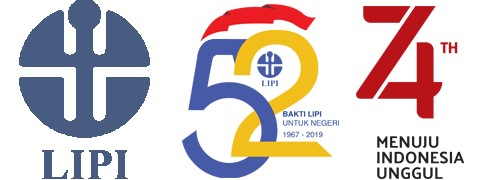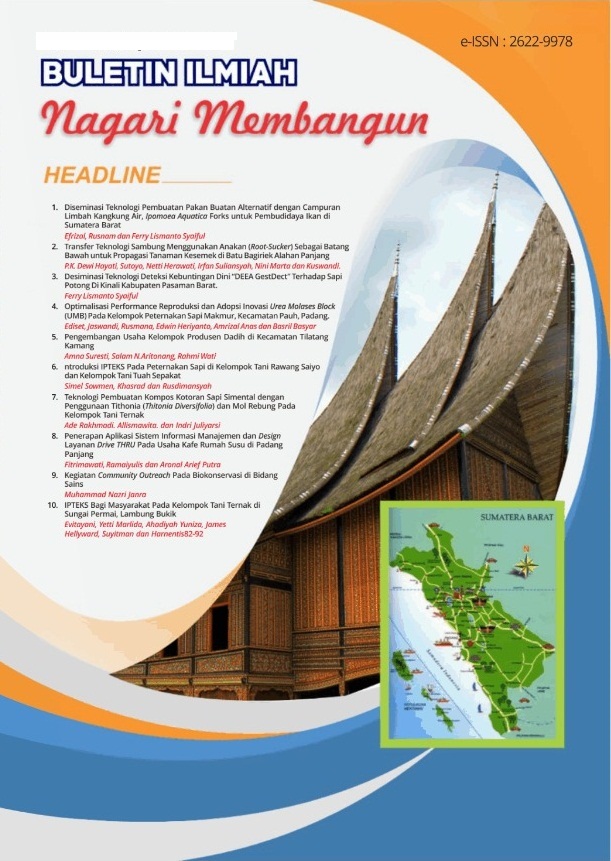PEMANFAATAN DAN PENGELOLAAN BANK SAMPAH DI KAWASAN NAGARI SIMPANG UNTUK MEWUJUDKAN NAGARI YANG BERSIH, NYAMAN DAN SEHAT
Abstract
A waste bank is a container that can solve the problems that people experience. The waste bank is a program that utilizes dry waste to be sorted and has managed, such as banking, but what is saved is waste. There are many ways that the managers of Nagari Simpang Garbage Bank have done to change the behavior of caring for the environment in the community in the Simpang village area, Simpang Alahan Mati District. Until now, the Garbage Bank in the Simpang village has done everything that can benefit its members. The focus of this research is to find an overview of the Waste Bank management's efforts, including knowing the planning, knowing the strategy, and knowing the results achieved by the Waste Bank managers in Simpang village in changing the behavior of people who do not care about the environment. The community service activity uses a qualitative approach with observation data collection techniques, interviews, and documentation studies. Furthermore, the results of data collection and observation are followed by socialization and empowerment in the community. This service activity discussion is based on data from interviews with the nagari guardian and three community members who are participants in the Garbage Bank in Simpang village. The theoretical study used is community empowerment, the concept of waste, and the concept of changing attitudes and behavior. The results of this service activity are shown in a positive direction because the Waste Bank management's efforts have changed the behavior of the Simpang village community, Simpang Alahan Mati District, to be more concerned about the environment.
Downloads
References
Barat, B. J. 2009. Pelatihan sistem bank sampah (recycle bank training) . Dipetik April 6, 2012, dari BPLDH Jawa Barat: http://www.bplhdjabar.go.id/index.php/news/250-pelatihan-sistem-banksampah-recycle-bank-training
Damanhuri, Enri dan Tri Padmi. 2010. Pengelolaan Sampah. Diktat Kuliah TL-3104. Fakultas Teknik Sipil dan Lingkungan Institut Teknologi Bandung
Jenrianto Limbong. 2015. Efektivitas pengelolaan sampah melalui bank sampah. Skripsi. Universitas Hasanuddin, Makassar.
Permanasai. 2012. Studi efektifitas bank sampah sebagai salah satu pendekatan dalam pengelolaan sampah yang berbasis masyarakat. Skripsi. Fakultas Teknik Lingkungan Institut Teknologi Bandung, Bandung.
Rakhmadi, A, Allisamawati, A, Juliyarsi, I. 2018. Teknologi pembuatan kompos kotoran sapi Simmental dengan penggunaan tithonia (Thitonia diversifolia) dan mol rebung pada kelompok tani ternak. Jurnal Hilirisasi IPTEKS. 1(3a): 50-55
Syaiful F.L. 2018. Diseminasi teknologi deteksi kebuntingan dini “DEEA GestDect” terhadap sapi potong di Kinali Kabupaten Pasaman Barat. Jurnal Hilisasi IPTEKS. 1(3): 17-25
Syaiful. F.L., U.G.S. Dinata dan Ferido. 2018. Pemberdayaan masyarakat Nagari Sontang Kabupaten Pasaman melalui inovasi budidaya sapi potong dan inovasi pakan alternatif yang ramah lingkungan. Buletin Ilmiah Nagari Membangun. 1(3): 21-31
Syaiful. F.L., U.G.S. Dinata dan Y. Hidayatullah. 2018. Pemberdayaan masyarakat melalui pemanfaatan limbah sekam padi sebagai bahan bakar kompor sekam yang ramah lingkungan di Kinali, Pasaman Barat. Buletin Ilmiah Nagari Membangun. 1(3): 62-69.





















